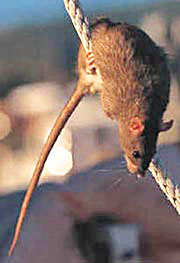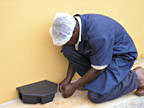Dealing with Rats and Mice in the Garden
Preventing Rats and Mice
If you are reading this you probably already have a problem with rats or mice. However, it is still worth mentioning some precautions you can take to deter them. This is good advice for avoiding infestation in the first place and is also important to prevent re-infestation after you have got rid of them.
The basic principles are to avoid making your garden attractive to rodents and to proof your home against access by rats and mice.
Avoid leaving food lying around. This includes waste food put onto compost heaps, particularly cooked meats, and food for birds, which should preferably be made available in specially designed bird feeders. If you put out food for other pets, always carefully dispose of any leftovers.
Inside the house, it is best to store food in metal or plastic containers and always clean up spilt food, even if (particularly if) it is in hard to access places. Otherwise rats and mice will find it.
You may be able to use modern technology to help discourage rodents but such methods should be used alongside good food hygiene and housekeeping rather than instead of. For example, ultrasonic devices are available that are tuned specifically to emit sound that is unpleasant to rats and mice but which is inaudible to humans and most other animals. You will find suppliers amongst our advertisers.
These devices, however, are really intended to deter rodents in the first place. They are not guaranteed to remove an infestation since it is reported that rats in particular have been known to get used to the sound.
Don't ignore the more traditional approaches. For example, a cat in the garden is an excellent deterrent to rats and mice. It may be yours or a neighbour's that visits on a regular basis.
For maximum deterrent effect, you want a cat with "attitude" rather than a well-fed house pet - the more unfriendly the better.
Read Also:
Getting Rid of Rats and Mice

The bottom line is that if you have rats or mice in your garden, you need to do something to get rid of them as quickly as possible. Your first decision is whether to do it yourself or to bring in the professionals.
Certainly, if the infestation is not too serious, there are effective methods that the gardener can employ. However, if you don't have the stomach for this kind of work or if you have tried unsuccessfully, you may need to call in the professionals, either from the local council or a private contractor.
If mice or rats are in your home, then your first option should be to call in the professionals. This is because of the risk of infection and also because you need to be careful what products you use if there are children or household pets around.
The DIY methods available include poisons and traps. These are readily available from garden centres, general stores or on-line. Great care is needed when handling and placing any kind of poison.
Similarly, some traps can be tricky to set and can give you a painful nip or worse if they are triggered prematurely. Rat traps in particular are very powerful and pose a risk to small children, family pets and other wildlife.
Professional Help with Getting Rid of Rats and Mice

If do-it-yourself methods are not effective, it really is time to call in the professionals.
It is not so much that they have better control methods available to them, but they are able to use stronger substances than are approved for DIY and they should have the knowledge and experience to locate and assess the true scale of the problem and to target the treatments more precisely.
For many people the first approach should be to their local council. Under the "Prevention of Damage by Pests Act", local authorities in the UK have a legal duty to keep their areas free from infestation be rats and mice.
Consequently, all authorities have services in place, though how they provide them and how much they charge can vary quite widely.
The alternative is to use one of the national chains or find a small independent company that operates in your area. All pest controllers should be qualified and registered with a recognised body such as the "National Pest Technicians Association" or the "British Pest Control Association".
As with local authorities, charges from commercial organisations can vary widely and therefore it is worth checking with a number of companies.
In addition to dealing with the immediate problem, professional pest controllers are able to assess the risk of future infestation and will recommend cost-effective changes you can make to reduce the likelihood of the problem returning.
